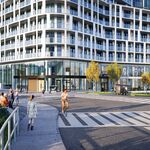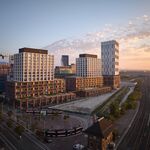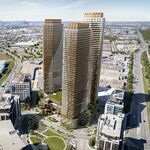TKTKTK
Senior Member
If you get rid of any.... they stop coming that way and find an other!
Or they stop coming entirely.
If you get rid of any.... they stop coming that way and find an other!
BTW, that's NOT a concrete factory - it's an abandoned silo.
I am quite aware of the location of both relative to the edge of the water (vs. the ambiguous term "waterfront") So are you saying that the presence of a relatively small structure like the silo have a greater impact on the developability of that stretch of land, vs. the Gardiner?
Except your choice is just as artificial, as a result of policies that are laden with values.
In addition, removal of the Gardiner does not eliminate the choice of driving - that option still exist.
Come now - that's because the area has just been rezoned for non-industrial purposes, plus being located in a flood zone (and actually, there is a freeze on development on the site - that's in spite of the fact that I can recall at least two proposals from the private sector).
So are you saying that the presence of a relatively small structure like the silo have a greater impact on the developability AND desirability of that stretch of land, vs. the Gardiner?
If you want a more interesting indicator of effect of the Expressway - you should take a look at whether the majority of structures along the Gardiner actually actively uses that side of the building.
Why would they face the buildings toward the Gardiner when they can face the lake instead?
Well, no, actually it doesn't. The section of the Gardiner we're talking about is either against the channel, or it's running pressed up against the rail embankment. There is no shortage of develop able land right now in that area, and any suggestion that the Gardiner is what's slowing progress is entirely disingenuous. The area is a wasteland because it's, well, an industrial wasteland.
The Gardiner, not being on the waterfront, is not standing in the way of its revitalization. Now, that derelict cement factory...why aren't Condos being built right next door?!
Really? Because I believe Monderman has cut off the leg you're trying to stand on.

Oh really? By allowing the Gardiner to stay up, you removes the option of developing a superior urban form that is more conductive to other modes of movement, such as walking or cycling. And that's on top of removing the option of an urban environment with addition density and other benefits.
I suppose if you value driving about those, that's your call. But don't tell me it's about increasing options.
Well, considering a building have four sides, why wouldn't it engages both sides?
The value and shape of developmental land is affected quite a bit by the presence of an ugly, loud, elevated highway right next door. It's not like you're all of the sudden going to see extra room for all sorts of new projects, but the land that's there WILL suddenly look a whole lot more interesting to developers. Which is the aim.
I'm not really sure what the shared space approach has to do with the point I made. I was referring to urban planning at a higher level. A lot of municipal government is social engineering. Zoning is social engineering. The "Official Plan" is social engineering. A libertarian approach would just see people build stuff wherever they thought it would make them the most money.
I'm not even sure how you'd run public transit in a free-market system: would each token cost twenty bucks?
This thread in a nutshell.

I thought that's how most public transit services began? First as private enterprise, then nationalized (or provincialized?).




